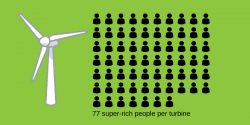Super-rich stoke the fire on the climate crisis
The richest 1% of the world’s population is responsible for as much carbon pollution as the poorest 66%, as has been revealed in a report by Oxfam, published last November.
The report, “Climate Equality: A Planet for the 99%”, discusses the difference in environmental impact between the general population and the super-rich, highlighting, in particular, their travel habits, lifestyle choices, and investment decisions as the main contributors to their levels of pollution.
Key takeaways from this report show that it would take one person among the poorest 1% of people in the world 1,500 years to produce as many carbon emissions as some of the richest 1%. These members of the super-rich, roughly 77 million people in total, balanced out the carbon savings from nearly one million wind turbines (77 people per turbine, effectively), used up twice as much of the remaining carbon that is safe to burn as the poorest half of the world’s population, and were responsible for 16% of global emissions in 2019 – more than that of all road transport emissions.

–These members of the super-rich, roughly 77 million people in total, balanced out the carbon savings from nearly one million wind turbines, with effectively 77 people per turbine.
The emissions of the super-rich alone are 22 times higher than the emissions rate compatible with the 1.5°C target set under the Paris Agreement.
The investment decisions of the super-rich are a particular point of concern. Oxfam estimates that the annual investment emissions of the individuals in their study hit 3.1 million tons of carbon per individual. This exceeds one million times that of someone in the poorest 10% of people.
This is especially impactful, as the effects of climate change are often felt by people from poorer backgrounds to a greater extent, with Oxfam finding that people living in countries with high wealth inequality are seven times more likely to die from flooding. 91% of deaths due to climate-related disasters have occurred in the global south, with inequalities between richer countries and the countries of the global south being 25% larger in general than they would be without global warming. Marginalized groups like certain ethnic communities, migrants, and women are particularly vulnerable, as in large areas of the planet they are less likely to have savings or social protection, leaving them at higher risk of physical and economic damage from climate disasters.
Furthermore, to maintain water resources in the poorest nations, water boreholes have to be drilled deeper, and often to aquifers that are drying up, depleted, or polluted.
The super-rich are plundering and polluting the planet to the point of destruction, leaving humanity choking on extreme heat, floods, and drought.
–Amitabh Behar, Oxfam’s International Interim Executive Director
Oxfam’s report also details their recommendations for dealing with this inequality, such as a 60% income tax on the richest 1%, which they predict would cut emissions by an amount equivalent to the United Kingdom’s total emissions, and raise over five trillion pounds. Their call is for the governments of richer countries to use a measure other than GDP for measuring progress, prioritizing human and planetary health over profit.
Oxfam’s International Interim Executive Director Amitabh Behar stated that: “The super-rich are plundering and polluting the planet to the point of destruction, leaving humanity choking on extreme heat, floods and drought,” and believes that “Taxing extreme wealth transforms our chances to tackle both inequality and the climate crisis.”
This solution, however, could be limited by something known as stealth politics. According to Dario Kenner, author of Carbon Inequality: The Role of the Richest in Climate Change and fellow at the University of Sussex, stealth politics is where the rich ally with policymakers, often through donations and funding, allowing the top 1% to impact policy change in a way average people cannot. This is particularly visible in the fossil fuels industry, where, for example, ExxonMobil spent $275 million on political lobbying in the United States from 1998 to 2019, and $20 million on direct political donations in the same country. Meanwhile, their CEO Darren Woods received just under $19 million in compensation in 2018 alone, with 62% of this being in the form of long-term incentives. Kenner, alongside Richard Heede of the Climate Accountability Institute, argues in a separate article that this presents Mr Woods, and thus ExxonMobil, with a long-term incentive to continue slowing down action on climate change.
One in four members of the United States Congress own stocks in fossil fuel companies
As a further example, the Guardian reports that one in four members of the United States Congress own stocks in fossil fuel companies – roughly 134 members in all.
An additional solution could be that of a carbon tax – accounting for the investment emissions of the rich and encouraging individuals with the largest carbon footprints to reduce them, either by withdrawing investments from companies with high emissions, or by lobbying for stronger environmental governance. Further consideration could potentially be made on the standard of regulators monitoring lobbying and corporate donations.
To summarise, although the super-rich are the key group that drives climate change and global emissions, this problem is deeper than just their lifestyle choices. Because of massive wealth inequality worldwide, not only from country to country but also within the countries themselves, political influence is concentrated among the rich, which produces policies that do not disadvantage their lifestyles and investments. As such, the wealth gap widens, and the emissions gap does too. Without question, this issue is complex – the deep link between wealth inequality and climate change means that to eliminate climate change, so too must wealth inequality be reduced.

Comments